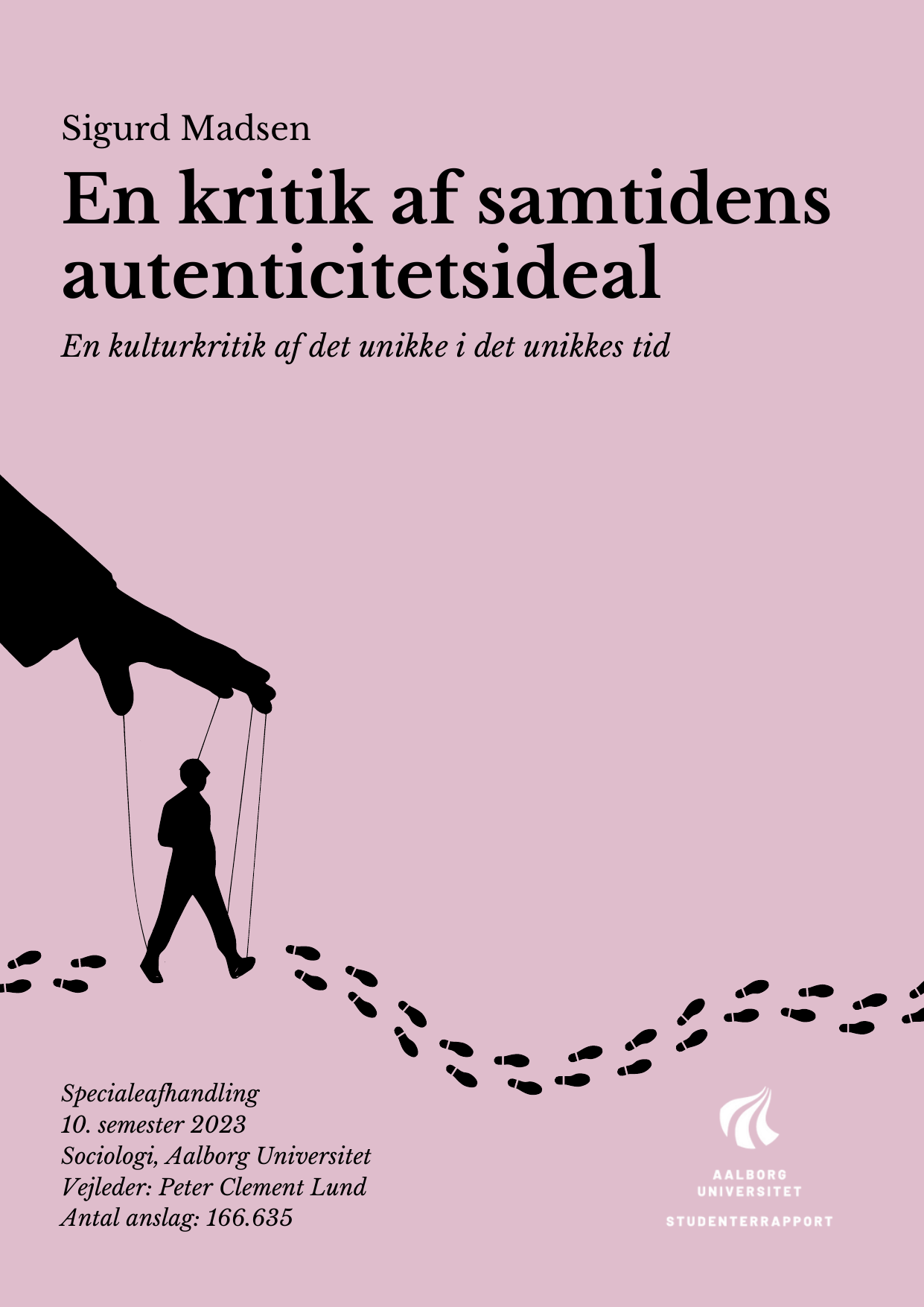
En kritik af samtidens autenticitetsideal: En kulturkritik af det unikke i det unikkes tid
Oversat titel
A Critique of the Contemporary Ideal of Authenticity: A Cultural Critique of the Uniqueness in the Era of the Unique
Forfatter
Semester
4. semester
Uddannelse
Udgivelsesår
2023
Afleveret
2023-05-31
Antal sider
80
Abstract
According to Andreas Reckwitz today we live in a society of singularities in which things that are valorized come to be considered as being unique. These unique things Reckwitz calls a singularity. At the same time there seems to be a great many repetitions of these so-called singularities. In this thesis I explore the meaning of this seeming paradox of the repetition of the unique: How can something which claims to be unique repeat itself and what does this say about today's society? To explore this I try to answer three related questions: 1) How can these repetitions be understood in the light of the society of singularities? 2) What negative aspects of today’s ideal of authenticity can be identified, and lastly: 3) Is it possible to formulate a new ideal of authenticity in the light of the problematic aspects identified? To answer the first questions I use Reckwitz’ book the Society of Singularities and here I find that the many repetitions of unique “things” is due to a historical joining of the idea of authenticity and the unique. Today's society is due the high standard of living obsessed with living a meaningful life and since the idea of authenticity has been linked with the unique, life’s meaning is today sought after in a very specific, conform manner. What this joining of these two concepts has led to is the forming of a specific ideal of authenticity. This ideal can be formulated in the following way: To become authentic one must interact with the unique. This leads me to the second questions where I explore the negative implications of this new ideal of authenticity. To do this I start exploring the implications of these repetitions: The society of the unique, can a bit paradoxically be labeled as a society of conformity. This is paradoxical if it is compared with the concept of authenticity in the works of the Danish philosopher Søren Kierkegaard whose understanding of authenticity I introduce afterwards. After this introduction I compare this understanding of the concept of authenticity with today’s ideal of authenticity and find that the two are in stark contrast to each other as mentioned before. Kierkegaard insists that becoming authentic is something which one can achieve in an interaction with the self and in isolation away from “the crowd”. This is a different orientation from today’s ideal of authenticity that insists that authenticity is achieved by interacting with the unique as the object and in an outward-directed manner. But today’s ideal of authenticity is not only in contrast to Kierkegaard’s understanding of authenticity. I argue in the following section that it also puts the individual in a situation of increased risk of depression. I end this part of the analysis with a section where I summarize and evaluate the two understandings of authenticity. I do this by comparing the two understandings of authenticity with a specific definition of the word authenticity, that understands the concept as meaning becoming aligned with an essence of the self. When making this comparison it becomes clear that today's ideal of authenticity in many ways is insufficient. Not only does it put the individual in an increased risk for depression, but also for certain mental states that haunts individuals of today. These are, besides depression, feelings of FOMO (Fear of missing out), shame, inadequacy and stress, and all of these are due to the outwardness and the object of today’s ideal of authenticity. In the end I conclude that Kierkegaard is right when he stresses that authenticity is achieved with the self as the object, but that both the kierkegaardian and today’s ideal of authenticity both are somewhat correct in the orientations, and that they in an ideal situation would seek out each other to find a golden mean between the two when it comes to their orientation. To answer the last question presented above I start with defending the use of authenticity in a sociological thesis by refuting parts of Theodor Adorno’s critique of the concept. This critique is not only needed to defend the thesis and its subject (Authenticity) but it also makes it possible to get a better understanding of the nature of authenticity. According to Adorno the self is constructed and as a consequence “fluid”. But when discussing this matter using the example of a transgender person, a mix between social constructivism and realism and the theories of Adorno and Pierre Bourdieu one can see that the self is both “fluid” and “solid”. I therefore characterize the ideal of authenticity for the future as having a special nature of being between essence and social construct. Furthermore I point out, in accordance with what I found out in previous parts of the thesis, that a future ideal of authenticity must have the self as object, and with regard to its orientation must find a golden mean between the outwardness of the reckwitzian and the inwardness of kierkegaardian understanding of authenticity. My approach to working with this problem is to take inspiration from a mix of critical realism and social constructivism under the heading “realistic constructivism”. Furthermore I work with a theoretical approach, by which I mean that I work primarily using different theories to discuss the problem without using empirical data such as interviews and observations. Instead the empirical data used in the thesis consists mostly of observations at the everyday level, and these act as examples of something more broad and general.
Emneord
